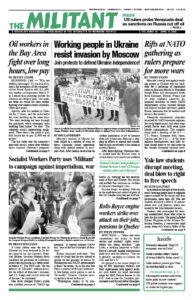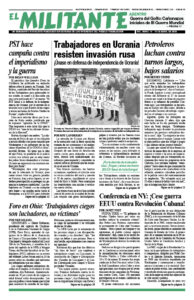White House and State Department officials traveled to Caracas March 5 to meet with Venezuelan President Nicolás Maduro to discuss a partial lifting of sanctions that Washington imposed on that country’s oil industry in 2017. The visit grows out of shifts in U.S. rulers’ efforts to defend their dominance worldwide following Moscow’s invasion of Ukraine. President Joseph Biden’s administration is seeking to secure oil sources following its ban of imports of Russian oil and gas. It also aims to drive a wedge between the regime of Russian President Vladimir Putin and Caracas.
Prior to Washington’s ban, 8% of U.S. petroleum imports came from Russia.
Washington’s overtures are also an attempt by the administration to find an exit from the current “maximum pressure” policy of the U.S. rulers that has led to a political stalemate between the Maduro government and opposition forces backed by Washington and other imperialist powers that have spent years trying to overthrow him.
After Hugo Chávez won election as president of Venezuela on a program of radical reform in 1998 and formed an alliance with the revolutionary government of Fidel Castro in Cuba, the U.S. targeted his regime and Maduro, who came to power after Chávez’s death.
Donald Trump’s administration broke relations with Venezuela in 2019, accusing Maduro of rigging presidential elections, and recognized Juan Guaidó, a pro-imperialist opposition politician, as the country’s leader. The administrations of both Barack Obama and Trump imposed harsh economic and trade sanctions against Venezuela, and have backed attempts to provoke a coup.
Given today’s stalemate, however, growing numbers within the capitalist opposition now favor participating in elections and reject Guaidó’s calls for a boycott. They also call for the lifting of sanctions as their rapprochement with the Maduro government moves ahead.
The March 5 visit came under criticism from Democratic and Republican politicians in Washington, who insist on maintaining pressure to maximize political and economic concessions from the Maduro government.
U.S. officials deny the purpose of the visit was to negotiate lifting sanctions in exchange for a boost in oil supplies for its refineries. They claim the delegation was there to pursue the release of six U.S. oil executives imprisoned in Venezuela on charges of embezzlement and a Cuban American arrested under terrorism charges. “Any sanctions relief” has to be “tied to concrete steps Maduro and the people around him take,” said National Security Adviser Jack Sullivan March 13.
Following the visit, Caracas released two of the imprisoned U.S. citizens, and Maduro announced he was restarting talks with the opposition.
This comes as Maduro is also making a rapprochement with weighty sections of Venezuelan capitalists and imperialist interests. His government has privatized a significant number of state-owned enterprises and established new alliances with oil and mining foreign ventures and local capitalist monopolies.
Caracas ready to boost supply
Caracas welcomes an opening to supply oil to U.S. and other markets. Prior to the sanctions, Venezuela was a top supplier to U.S. refineries. Sanctions blocked purchases from Venezuela’s state-owned oil company PDVSA, and foreign companies were forced to abandon joint ventures in the country.
If Washington eases sanctions oil giant Chevron says it will take operating control of its joint ventures and boost supplies of crude oil to the U.S., allowing company owners to regain a foothold in Venezuela’s lucrative oil industry they covet.
Years of sanctions also barred imports of key supplies and equipment needed to repair and update oil drilling and processing facilities. As a consequence, capacity has plummeted from previous production levels.
Above all, sanctions have had a devastating impact on workers and farmers, sharply exacerbating inflation that ran at 340% in the last 12 months. More than 6 million people have left the country since 2015.
These pressures pushed the Maduro government to establish trade and financial ties with Russia, China, and Iran, whose rulers seek to advance their own interests in the region against their rivals. PDVSA’s international monetary transactions are handled by accounts in Russia and are likely to suffer from sanctions imposed on Moscow by Washington and capitalist powers in Europe.
One of Washington’s aims is to drive a wedge between Caracas and Moscow, which is Venezuela’s main military supplier. Venezuelan officials have said Caracas remains a “committed ally of the Russian government,” but welcomes the return of U.S. companies to Venezuela.
“We’ve been doing oil business with U.S. companies for 100 years,” said Venezuelan Foreign Minister Félix Plasencia at a March 12 meeting with Joseph Borrell, EU foreign affairs representative. “We never asked them to leave the country. If they respect my country’s sovereignty and legitimacy we can do a lot together in the oil business.”


